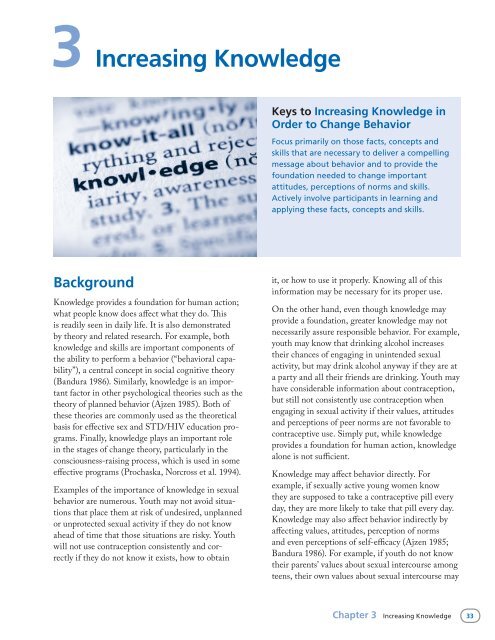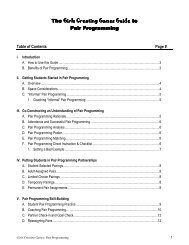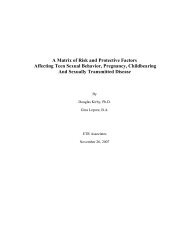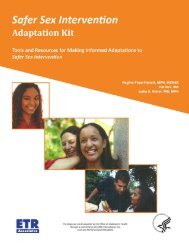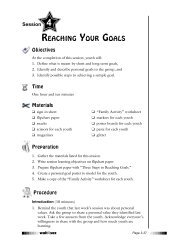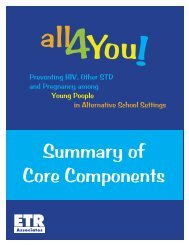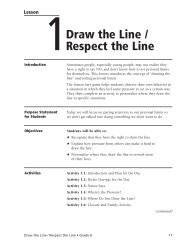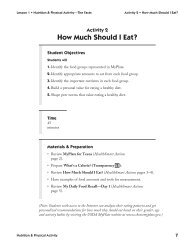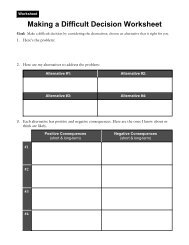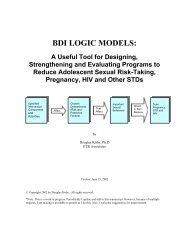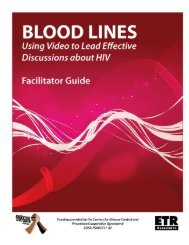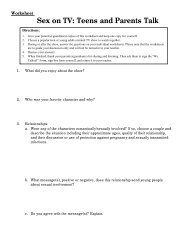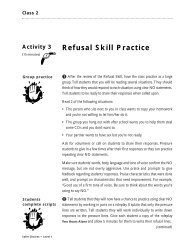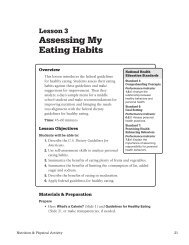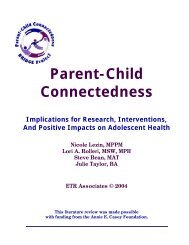Reducing Adolescent Sexual Risk: A Theoretical - ETR Associates
Reducing Adolescent Sexual Risk: A Theoretical - ETR Associates
Reducing Adolescent Sexual Risk: A Theoretical - ETR Associates
- No tags were found...
You also want an ePaper? Increase the reach of your titles
YUMPU automatically turns print PDFs into web optimized ePapers that Google loves.
3 Increasing KnowledgeKeys to Increasing Knowledge inOrder to Change BehaviorFocus primarily on those facts, concepts andskills that are necessary to deliver a compellingmessage about behavior and to provide thefoundation needed to change importantattitudes, perceptions of norms and skills.Actively involve participants in learning andapplying these facts, concepts and skills.BackgroundKnowledge provides a foundation for human action;what people know does affect what they do. Thisis readily seen in daily life. It is also demonstratedby theory and related research. For example, bothknowledge and skills are important components ofthe ability to perform a behavior (“behavioral capability”),a central concept in social cognitive theory(Bandura 1986). Similarly, knowledge is an importantfactor in other psychological theories such as thetheory of planned behavior (Ajzen 1985). Both ofthese theories are commonly used as the theoreticalbasis for effective sex and STD/HIV education programs.Finally, knowledge plays an important rolein the stages of change theory, particularly in theconsciousness-raising process, which is used in someeffective programs (Prochaska, Norcross et al. 1994).Examples of the importance of knowledge in sexualbehavior are numerous. Youth may not avoid situationsthat place them at risk of undesired, unplannedor unprotected sexual activity if they do not knowahead of time that those situations are risky. Youthwill not use contraception consistently and correctlyif they do not know it exists, how to obtainit, or how to use it properly. Knowing all of thisinformation may be necessary for its proper use.On the other hand, even though knowledge mayprovide a foundation, greater knowledge may notnecessarily assure responsible behavior. For example,youth may know that drinking alcohol increasestheir chances of engaging in unintended sexualactivity, but may drink alcohol anyway if they are ata party and all their friends are drinking. Youth mayhave considerable information about contraception,but still not consistently use contraception whenengaging in sexual activity if their values, attitudesand perceptions of peer norms are not favorable tocontraceptive use. Simply put, while knowledgeprovides a foundation for human action, knowledgealone is not sufficient.Knowledge may affect behavior directly. Forexample, if sexually active young women knowthey are supposed to take a contraceptive pill everyday, they are more likely to take that pill every day.Knowledge may also affect behavior indirectly byaffecting values, attitudes, perception of normsand even perceptions of self-efficacy (Ajzen 1985;Bandura 1986). For example, if youth do not knowtheir parents’ values about sexual intercourse amongteens, their own values about sexual intercourse mayChapter 3 Increasing Knowledge 33


